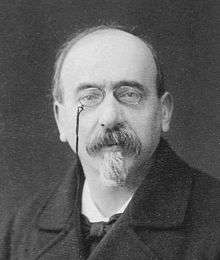Victor Cherbuliez

| French literature |
|---|
| by category |
| French literary history |
| French writers |
|
| Portals |
|
Charles Victor Cherbuliez (German: [ʃɛʁbylje]; 19 July 1829 – 1 July 1899)[1] was a French novelist and author. He was born at Geneva, Switzerland and died at Combs-la-Ville. He was the eleventh member elected to occupy seat 3 of the Académie française in 1881.
Biography
Cherbuliez was born at Geneva, where his father, André Cherbuliez (1795–1874), was a classical professor at the Université de Genève. He was descended from a family of Protestant refugees, and many years later Victor Cherbuliez resumed his French nationality, taking advantage of an act passed in the early days of the Revolution. Geneva was the scene of his early education; thence he proceeded to Paris, and afterwards to the universities of Bonn and Berlin.
Cherbuliez returned to his native town and engaged in the profession of teaching. After his resumption of French citizenship he was elected a member of the Académie française (1881), and having received the Légion d'honneur in 1870, he was promoted to be officer of the order in 1892.
Cherbuliez was a voluminous and successful writer of fiction. His first book, originally published in 1860, reappeared in 1864 under the title of Un Cheval de Phidias: it is a romantic study of art in the golden age of Athens. He went on to produce a series of novels.
Most of these novels first appeared in the Revue des deux mondes, to which Cherbuliez also contributed a number of political and learned articles, usually printed with the pseudonym G Valbert. Many of these have been published in collected form under the titles L'Allemagne politique (1870), L'Espagne politique (1874), Profils étrangers (1889), L'Art et la nature (1892), etc. The volume Etudes de littérature et d'art (1873) includes articles for the most part reprinted from Le Temps.
The earlier novels of Cherbuliez have been said with truth to show marked traces of the influence of George Sand; and in spite of modification, his method was that of an older school. He did not possess the sombre power or the intensely analytical skill of some of his later contemporaries, but his books are distinguished by a freshness and honesty, fortified by cosmopolitan knowledge and lightened by unobtrusive humour, which fully account for their wide popularity in many countries besides his own. His genius was the reverse of dramatic, and attempts to present two of his stories on the stage have not succeeded. His essays have all the merits due to liberal observation and thoroughness of treatment; their style, like that of the novels, is admirably lucid and correct.
Bibliography
- Le Comte Kostia (1863)
- Le Prince Vitale (1864)
- Le roman d'une honnête femme (1866)
- L'aventure de Ladislas Bolski (1869)
- Miss Rovel (1875)
- Samuel Brohl et Cie (1877)
- L'idée de Jean Téterol (1878)
- Noirs et rouges (1881)
- La vocation du comte Ghislain (1888)
- Une gageure (1890)
- Le Secret du précepteur (1893)
- Jacquine Vanesse (1898)
References
- ↑
 "Cherbuliez, Charles Victor". Encyclopædia Britannica. 6 (11th ed.). 1911. p. 82.
"Cherbuliez, Charles Victor". Encyclopædia Britannica. 6 (11th ed.). 1911. p. 82.
 This article incorporates text from a publication now in the public domain: Chisholm, Hugh, ed. (1911). "Cherbuliez, Charles Victor". Encyclopædia Britannica. 6 (11th ed.). Cambridge University Press. p. 82.
This article incorporates text from a publication now in the public domain: Chisholm, Hugh, ed. (1911). "Cherbuliez, Charles Victor". Encyclopædia Britannica. 6 (11th ed.). Cambridge University Press. p. 82.
External links
| Wikisource has original works written by or about: Charles Victor Cherbuliez |
- Works by Victor Cherbuliez at Project Gutenberg
- Works by or about Victor Cherbuliez at Internet Archive